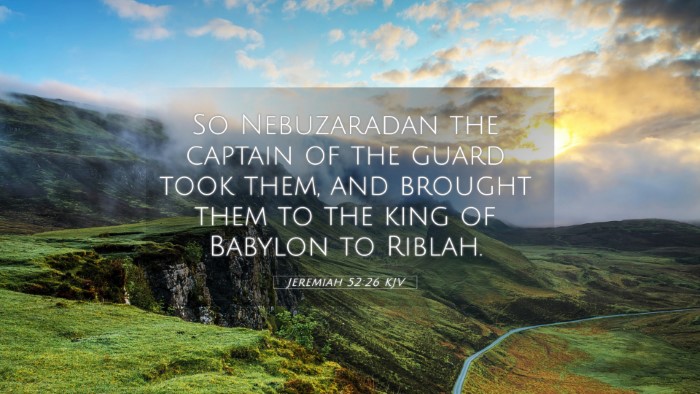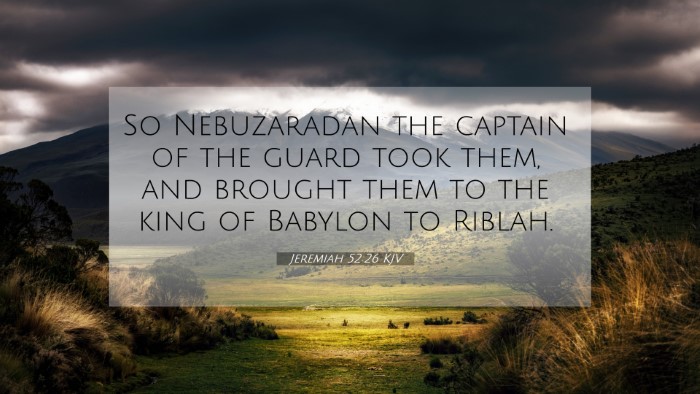Bible Verse Meaning: Jeremiah 52:26
Jeremiah 52:26 states: "So Nebuzaradan the captain of the guard took them, and brought them to the king of Babylon to Riblah." This verse concludes the narrative of the fall of Jerusalem and illustrates the consequences faced by those who were left after its destruction.
Interpretation and Summary
This verse is a poignant reminder of the fate that befell the people of Judah after the Babylonian conquest. Through the combined insights of Matthew Henry, Albert Barnes, and Adam Clarke, we can derive a comprehensive understanding of its significance.
-
Matthew Henry's Commentary emphasizes the dire situation faced by the remnant of the people. It highlights the transition from a nation of promise to one taken captive, reinforcing the gravity of disobedience to God. The chief aim was to portray the fallibility of human strength and pride in light of divine judgment.
-
Albert Barnes' Notes focus on the historical context, noting that the actions of Nebuzaradan were not merely tactical but also reflected God's sovereignty in dealing with Judah’s unfaithfulness. By bringing the captives to Riblah, a geographical site associated with judgment, the narrative evokes a strong sense of inevitability about God's plans.
-
Adam Clarke's Commentary outlines the prophetic fulfillment found within this verse. He explains how Nebuchadnezzar's agents were instruments of divine will, emphasizing God’s control over nations and kingdoms. This connection points readers toward the bigger picture of God's redemptive history, showing that judgment is sometimes a step towards restoration.
Key Themes and Theological Insights
This verse encapsulates several essential theological themes such as:
- **The Sovereignty of God**: The fall of Jerusalem and the exile illustrate God's ultimate authority over nations, fulfilling His promises and prophecies.
- **Consequences of Sin**: The captivity of the people serves as a stark reminder of the repercussions of turning away from God’s commands.
- **Hope in Restoration**: While the verse depicts a moment of despair, the broader narrative ultimately points toward eventual restoration and the continuation of God's covenant with His people.
Cross-References and Thematic Connections
In studying Jeremiah 52:26, multiple Bible verse cross-references illuminate its meaning:
- 2 Kings 25:20 - Provides an account of the same event with additional details on Nebuzaradan’s actions.
- Jeremiah 39:9 - Discusses the fate of those left in Jerusalem and the broader implications of the destruction.
- Ezekiel 12:15 - Offers perspective on God’s intent in scattering His people as a form of judgment.
- Lamentations 1:3 - Reflects upon the sorrow of the people of Jerusalem following their exile.
- Isaiah 39:6-7 - Prophetically speaks about the Babylonian captivity, tying in Jeremiah's narrative with earlier warnings.
- Daniel 1:1-2 - Shows the fulfillment of Jeremiah’s prophecies regarding exile and the taking of Jerusalem’s treasures.
- Romans 11:11-12 - Connects to the theme of judgment and grace, illustrating God’s plan for both Jews and Gentiles.
- Matthew 24:2 - Jesus references the destruction of the temple, echoing the finality seen in Jeremiah's prophecy.
- Revelation 18:2 - Represents the ultimate fall of a great city, paralleling the fall of Jerusalem.
- Hebrews 12:29 - Alludes to the idea of God as a consuming fire, representing His judgment and the urgency for repentance.
Conclusion
In Jeremiah 52:26, the finality of judgment is depicted, allowing readers to understand the weight of Israel's disobedience and the implications that follow. The thematic connections and biblical cross-references provide a wider context for interpreting this scripture, giving us insight into God’s overarching narrative of redemption amidst judgment. By engaging with various commentaries and scriptural links, we can deepen our understanding of the multifaceted lessons contained within this profound verse.
Additional Resources
If you are interested in further study, consider exploring tools for Bible cross-referencing or utilizing a Bible concordance for more extensive biblical research. Understand how to use these tools effectively will aid in identifying connections between Old and New Testament texts and enable a more enriched understanding of scripture.


